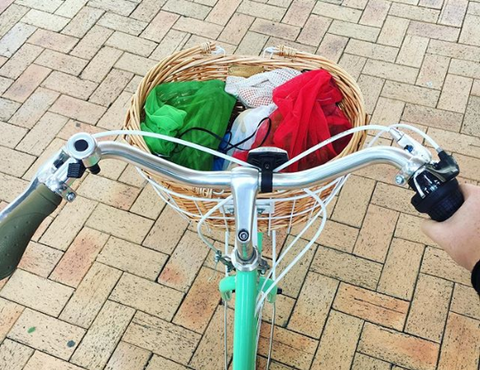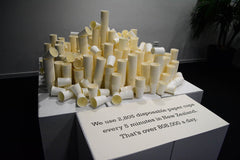Reducing carbon emissions requires action from all of us – government, businesses and individuals. So here’s a quick guide on what you can do…

Ride Your Bike Is it a coincidence that Denmark is consistently ranked in the top 3 happiest countries and also has one of the highest per capita rates of cycling? Maybe, but they’ve also found that children who cycle and walk to school are much better at concentrating. The more people who cycle the safer it will be, so download a copy of Christchurch’s cycling maps and get on your bike (Also, Denmark and Christchurch are both flat, so we have no excuse!)
Support Local and Ethical Businesses If we want a world where businesses take responsibility for the environment, we have to support them. Shopping locally keeps money in the community and reduces carbon emissions and packaging. When you shop from ethical businesses your dollars are working all the way down the supply chain improving lives and the environment. To help you out, we've put all our NZ-made products on sale until the end of May.
Eat Less Meat. But this doesn’t mean you have to be vegan or even vegetarian, if we all switched to eating a Mediterranean diet (chicken a couple of times a week, beef once a month, and plenty of plant based foods) we could solve 15% of global warming by 2050! It’s equivalent of taking 1 billion cars off the road.
Switch to Reusables New Zealanders use 808,000 disposable coffee cups every year, wasting re sources and emitting carbon. Reusable coffee cups are bulky and can leak in your bag – try a Stojo collapsible coffee cup which conveniently fits in your pocket or bag.
sources and emitting carbon. Reusable coffee cups are bulky and can leak in your bag – try a Stojo collapsible coffee cup which conveniently fits in your pocket or bag.
Speak Up – Fill in the CCC survey to let the council know how you are reducing your carbon emissions and how you’d like them to improve.
]]>

Recycling soft plastics seemed like a silver bullet – we could eat the same packaged foods without feeling guilty about creating landfill waste, or ocean plastic pollution. But the problem with recycling being proposed and sold as a solution is that we all carry on consuming in the same way because "it can be recycled".
The Soft Plastic Recycling Scheme has taught us all a valuable lesson: most of the waste in household rubbish bins in New Zealand is likely made up of soft plastic.
 The scheme is planned for a return later this year but at a smaller scale which will leave most of the country’s soft plastics destined for landfill. So what can we do to reduce our soft plastic consumption? Donna Peterson from the waste management organisation WasteMINZ, asks "Do we actually really need to be using this amount of soft plastics? Are there alternatives out there that are actually better from an environmental perspective in terms of not creating waste in the first place."
The scheme is planned for a return later this year but at a smaller scale which will leave most of the country’s soft plastics destined for landfill. So what can we do to reduce our soft plastic consumption? Donna Peterson from the waste management organisation WasteMINZ, asks "Do we actually really need to be using this amount of soft plastics? Are there alternatives out there that are actually better from an environmental perspective in terms of not creating waste in the first place."
At The Rubbish Whisperer we love reusable alternatives to single-use plastics and want to help you begin ditching the soft plastic habit. So we’re putting our NZ-made reusable produce bags on sale until the end of Easter.
]]>
OPINION: It’s a fantastic feeling when a stranger stops you in the produce section and says, “I love this, where did you get it?”
What can give you an even more satisfying glow is when it is an item that also impacts the environment in a positive way.
Ever since I created Rubbish Whisperer’s colourful reusable produce bags, I get stopped by shoppers in my local supermarket and asked where they can buy them. I use reusable produce bags for many reasons – to prevent the overloading of my kitchen draws with plastic, to prevent waste ending up in our oceans, to live in accordance to my principles – but I’ve noticed it’s getting a great deal of unexpected attention as a lifestyle must-have. This begs the question: have colourful reusable produce bags become the new currency for coolness?
Despite the amount of lifestyle trends we see come and go, reducing plastic waste is steadily gaining momentum throughout New Zealand and the world. Supermarkets and stores are jumping on the bandwagon trying to reduce the amount of plastic wastage that they create and offering alternatives to plastic bags.

Foodstuffs and Countdown supermarkets have both pledged to stop the sale of single-use plastic bags by the end of 2018, but this is just one plastic issue out of the many that are still yet to be tackled.
It makes me feel hopeful to see the number of people committed to making a difference to one small plastic habit at a time. And every bit truly does count. In 2017 alone, the number of reusable produce bags The Rubbish Whisperer sold will save over 9.7 million plastic produce bags from going out into the world and most likely ending up in our oceans.
When I began creating reusable produce bags, I wanted to give Kiwis an easy way to make one impactful change to the way they care for the environment. I didn’t expect it to become a trendy lifestyle accessory.
Looking at them now though, I can see how it is a fun and stylish trend to adopt: it brings a certain kind of lightness to the serious business of recycling. The bright colours can perk up even the ugliest trolley, and it makes loading fresh produce that doesn’t go soggy into your fridge a breeze.

Best of all, it eliminates decision fatigue. After 7 years of using the same set of reusable produce bags, I don’t have to think about the pile of plastic bags produce bulging out of my kitchen drawer. The habit of whipping out the 9-gram reusable bags has become a comforting habit. When it comes to tackling environmental issues, I have learnt that it’s the habits we practice over time that are likely to make the biggest impact. Let’s stop eco-shaming and competing to be greener than the next person. It’s about finding what works for you.
]]>There is already a huge amount of plastic rubbish floating in the sea, causing a great deal of damage. We can't change what's happened in the past, but we can change our actions for the future. In Plastic Free July, which items are you going to swap for a reusable or biodegradable alternative?



The ocean covers 72 % of the planet and is home to 97% of life on Earth. It drives and moderates our climate and weather and is ultimately the source of the water we drink. But every year we are responsible for more than 7 million tonnes of plastic rubbish making its way into the sea. With 80% of this rubbish coming from the land it is time for us to make some smarter choices so the planet is preserved for future generations.
Recent reports of the waste washing up on Henderson Island were shocking. Despite being an uninhabited island and part of a UNESCO World Heritage site, the island had the highest density of plastic rubbish anywhere in the world. Of the 15 most common items appearing on their beaches, 10 were plastic. Luckily, we can easily replace these items in our own homes with environmentally friendly alternatives that don’t cost the earth!
| RUBBISH | OCEAN FRIENDLY |
| Plastic Bottle | Reusable bottle |
| Plastic Bag | Basket / cloth bag / cardboard box / reusable produce bags |
| Lollipop stick | Buy from the bulk bins / lollies without sticks or with paper sticks |
| Pen Lid | Pencils / lidless pens (try My Mojo) |
| Drinking Straw | Paper straws / stainless steel straws |
| Plastic Razor | Stainless steel razors (try Mancave) |
| Cigarette Lighter | Matches / Zippo style refillable lighter |
| Caps & Lids | Reusable bottle |
| Toothbrush | Bamboo toothbrush |
| Plastic Cutlery |
Wooden / bamboo or reusable cutlery |
So, with plastic bags taking between 100-400 years to breakdown and plastic bottles taking up to 450, the choice to make a change seems simple. Take a look at The Rubbish Whisperer’s products page for paper straws, stainless steel straws, reusable produce bags and lunch pockets - feel good about the future you are creating from this July forwards.
]]>